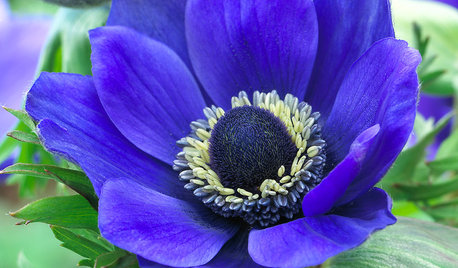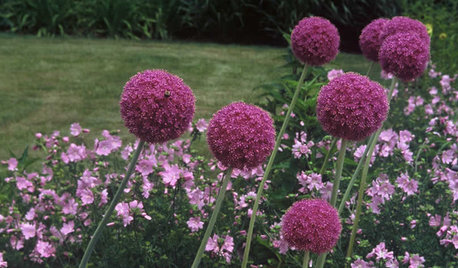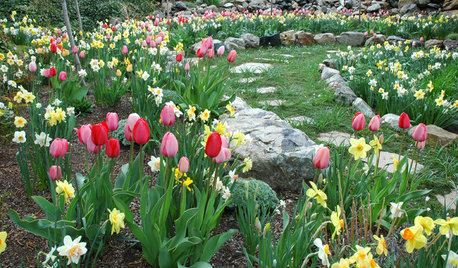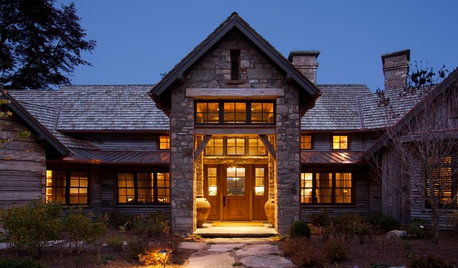New York Times article on Southern Bulb Company
Interesting article! This originally appeared in the New York Times. It is about some Texas A&M graduates who have started a company selling bulbs they have "rescued" from abandoned homesteads and cow pastures throughout the south. I think you will enjoy it!
NYT Story on Southern Bulb Company
July 6, 2006
The Bulb Hunter
By GINIA BELLAFANTE
A few weeks ago Chris Wiesinger traveled to the most forlorn area of Lufkin, Tex., an old railroad town not too far from the border of Louisiana, and from the window of his Ford F-150 pickup almost immediately noticed a Zephyranthes grandiflora. At 25, he is rarely prone to effusion, but the sight of the flower caused him to smile in such a way that his whole face rippled, like a pool of water into which a pebble has been thrown.
The plant, more typically known as a rain lily, was blooming on a vacant lot surrounded by four bungalows, all of them boarded up. "There's nothing else here," Mr. Wiesinger said as he walked toward the flowers. "It never gets touched or cared for, and just look at it. Well, my goodness."
Mr. Wiesinger makes a living finding pretty things in ravaged places. In 2004 he started the Southern Bulb Company with the aim of reintroducing flowers long out of vogue, committing himself exclusively to those that have ably asserted themselves against the particular cruelties of exceedingly hot weather for decades, even centuries.
While the pursuit of heirloom botanicals may have an air of elitism about it, Mr. Wiesinger goes after what one might think of as the Barbara Stanwycks of floriculture: resilient flowers without patrician connotation that thrive in areas largely lost to the economic revival of the New South. His is the world of old cotton towns, condemned properties, abandoned buildings and houses where torn sofas crest on bowed porch fronts. "Most of the time you're not finding this stuff in the fancy neighborhoods around Dallas," he said, "but in places where people couldn't afford to plant new things."
Drawing on a business plan he devised three years ago as a senior in Texas A&M's horticulture program, he collects the bulbs and propagates them on his small farm in Mineola, about two hours east of Dallas. Afterward, he distributes them to nurseries and over the Internet through his Web site, southernbulbs.com.
His passion for reprising old varietals, some from Texas, some from the Southeast, has gained him considerable attention, earning him a spot on House & Garden's list of most important American tastemakers in April and turning him into a sought-after speaker on the garden club circuit.
In many ways Mr. Wiesinger represents plant hunting's latest iteration. From the Victorian era through much of the 20th century, plant hunting was an adventurer's diversion, taking its practitioners to the mountains of the Congo or Peru to return home to the United States or Western Europe with the most exotic species.
Mr. Wiesinger is part of a more recent movement focused on retrieving plants domestically. Beyond that, though, he is breeding bulbs at a time when virtually all the people doing the breeding are still Dutch, explained Tom Christopher, a gardening writer and contributing editor for House & Garden. "Chris is moving something that's been the preserve of a handful of collectors to common gardeners," he said.
A bulb bred in the Netherlands, or a plant imported from the Himalayas, will not necessarily thrive in a warm climate. "We are conditioned to think of hardiness in terms of what can withstand cold weather," Mr. Christopher said, "and not in terms of what will survive extreme heat and humidity."
Mr. Wiesinger's innovation is the specificity of his interest in supplying a gardening market whose needs have largely been ignored. The proliferation of nurseries with nationally distributed catalogs and retailers like Home Depot and Lowe's has contributed to a homogenized gardening culture that takes insufficient account of regional differences, said Jason Powell, an owner of Petals From the Past, a nursery in Jemison, Ala. "Gradually," Mr. Powell said, "we've seen fewer hardy, unusual flowering plants, fewer plants that are tried and true and tough."
The advantage of heirlooms generally is not merely that they speak to a cultural interest in nostalgia but that they tend to prosper efficiently, requiring less water, spraying and vigilance. "These kinds of plants are like comfort food," explained Felder Rushing, a horticulturist in Jackson, Miss. "They can be taken care of almost instinctually."
After spotting the rain lily in Lufkin, Mr. Wiesinger made his way to the nearest house with signs of human activity, knocked on the door and was greeted by a middle-age woman who told him the property belonged to a neighbor's brother. Mr. Wiesinger explained that he collected plants and sought to reach the owner for permission to dig up a bulb or two. The woman assured him that no one would mind, shared her own tale of misfortune her home was about to be condemned if she didn't make various improvements  and finally asked if he might like to borrow a shovel.
Mr. Wiesinger's endeavor relies on the notion that strangers will bestow him a great deal of generosity. When searching for bulbs he follows a strict protocol, which is to say that he never merely takes what he sees but almost always gets what he wants. If he spots a Mrs. James Hendry crinum, or a hoop petticoat daffodil outside an abandoned house somewhere in, say, Alabama, he calls the local tax office to get the name of the owner, contacts the person and explains his purpose.
In many cases the owner is far off, paying taxes on an old family home. "It's just amazing how nice people are," Mr. Wiesinger said. He managed to track down the owner of one beat-up house, calling him in Victoria, in South Texas. "I asked him if I could have a few bulbs and he said, 'Take all of them, and you can have the house too, if you want that.' "
In certain instances he feels obliged to pay for his inventory. A few months ago he pulled several thousand daffodil bulbs from the front yard of a mobile home in Wells, Tex., and paid $100 to the family living there. "I try to always give something back," Mr. Wiesinger said. "If it isn't money, then I'll plant something new in the place where I took something, or with gardeners I'll offer to barter something they might not have." Rarely is he ever asked for anything in return.
Cemeteries play a big role in the life of some plant hunters. Over 25 years ago a group called the Rose Rustlers, also based in Texas, began taking cuttings from them in an effort to locate and resurrect various varieties of antique roses. Mr. Wiesinger often uses the plant life near gravestones as an indicator of what he can hope to find elsewhere in the area, but his own ethical code prohibits him from removing samples of plants or uprooting them.
"Graveyard etiquette is a strange thing," he said. "Some people will say: 'There are great flowers there! Dig them up!' But I don't know, I just can't help feeling that it is wrong."
An outdoorsman given to oxford-cloth shirts, Mr. Wiesinger possesses a demure geniality. If people seem eager to give him things, it is largely because he seems so nervous about asking. He spends most of his days traveling, passing much of his time in extended conversation with the people on whose front steps he happens to land.
After visiting Lufkin Mr. Wiesinger made a stop in nearby Alto to inquire about a hardy amaryllis. The woman in possession of it, Darline Lindsey, began to talk about her injured shoulder, a shower she was in the midst of installing, one of her relatives in Pennsylvania, a daughter who was or was not going to move to the area.
In Nacogdoches an hour or so later, a doctor he had met while lecturing, who had promised him some crinums, talked about his medical career in San Francisco, his affinity for the opera, his wife and the brain tumor she had suffered.
"That is a lot of what I do," Mr. Wiesinger said, back in the pickup. "I listen. I listen to the stories about the bathroom renovation. Often people will be fixing lunch, and they'll ask me to stay, so I stay for lunch. Grandmothers want to fix me up with their granddaughters. I get that sometimes  they'll say: 'Do you have a wife? I have this lovely granddaughter.' And I say, 'Thank you ma'am, now I need to be on my way.'
"I dated someone for three months once but with me always on the road ... Well, anyways."
His own story, as he is well aware, has helped contribute significantly to his renown. Mr. Wiesinger runs the Southern Bulb Company out of a trailer with the help of three friends: Brad Gaultney and Ben Arcuni, both of whom were in the corps of cadets at Texas A&M with him, and Amanda George, a former White House intern for Laura Bush. The three men live together in a rented 250-square-foot cabin, near the farm he owns in Mineola, sleeping on mattresses on the floor. This summer a fourth roommate, Grant Cox, an intern at Southern Bulb, moved in.
Ms. George, a native of Mineola who said her great-great-grandfather was shot by Geronimo, lives down the road with her mother and is teaching herself Arabic. Every night the group convenes for dinner in the cabin, often eating the bass they catch in the lake out back. Because they live in a dry county and know no other single people their own age, they read Patrick O'Brian novels before bed and go to sleep early.
The son of an oil-industry executive, Mr. Wiesinger grew up in Houston and California, where he attended Bakersfield Christian High School and played football. One day in his junior year, someone dropped off a few boxes of bare-root roses as a donation to the school. Mr. Wiesinger planted them and so began his interest in gardening. "Anyone sent to detention had to come out and help me weed," he said.
The Southern Bulb Company has yet to make a profit, and Mr. Wiesinger cannot afford to pay his friends much, he said. All in the group eagerly work six days a week, managing the farm, growing the bulbs, fulfilling orders and occasionally joining him in exploratory expeditions. Ms. George and Mr. Cox travel to fairs on weekends to promote the product.
If the focus seems unusually intense, it is because their interest in gardening is motivated less by aesthetic predilection than it is by philosophical belief. Mr. Wiesinger and his friends are all observant Christians who see gardening as a lesson in the politics of personal responsibility and the value of rewards deferred.
"You can't take a day off from life, and plants teach you that," Mr. Wiesinger said. "There's always responsibility, with everything, always. A lot of people my age don't understand that, or they don't understand that a lack of their own responsibility will hurt someone."
Mr. Gaultney left a well-paying job at General Electric in Dallas to work for the Southern Bulb Company because cubicle life left him feeling empty, he said. After her White House internship was completed Ms. George, who has been paying off a credit card bill for her $1,900-a-month apartment in Washington, returned to Mineola to seek a job with health insurance. Southern Bulb offered it.
"The fact that Chris was so passionate and my age was very appealing," Ms. George said. "But he also understood all the things I hold dear. We're all so conditioned to expecting things right when we want them, and gardening is a very different approach to life."
On his way to a friend's wedding in Austin one day, Mr. Wiesinger talked about some of his grander ambitions. The poverty he encounters in his work stirs his philanthropic impulses. He dreams of making enough money to buy old houses, create new gardens and reinvigorate depressed communities.
"Ross Perot is from East Texas," he remarked. "Ross Perot and Southern Bulbs team up to restore East Texas. Wouldn't that be cool?"
Copyright 2006 The New York Times Company
















natal
greenelbows1
Related Professionals
Edmond Landscape Architects & Landscape Designers · Ilchester Landscape Architects & Landscape Designers · Lyons Landscape Architects & Landscape Designers · New Mexico Landscape Architects & Landscape Designers · Newcastle Landscape Architects & Landscape Designers · Peabody Landscape Contractors · Brookline Landscape Contractors · Canby Landscape Contractors · Lynchburg Landscape Contractors · Middle River Landscape Contractors · Petaluma Landscape Contractors · Rockwall Landscape Contractors · Selden Landscape Contractors · The Woodlands Landscape Contractors · West Allis Landscape Contractors